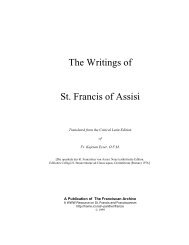the history of heresies, and their refutation - Catholic Apologetics ...
the history of heresies, and their refutation - Catholic Apologetics ...
the history of heresies, and their refutation - Catholic Apologetics ...
Create successful ePaper yourself
Turn your PDF publications into a flip-book with our unique Google optimized e-Paper software.
ano<strong>the</strong>r Theodotus, called Argentarius, or <strong>the</strong> Banker, who taught that Melchisadech was Christ, or even<br />
greater than Christ, on account <strong>of</strong> that verse <strong>of</strong> <strong>the</strong> Psalms " Thou art a priest for ever, according to <strong>the</strong><br />
order <strong>of</strong> Melchisadech ;" <strong>and</strong> his followers were afterwards called Melchisadechites (21).<br />
<br />
14. Hermogenes said that matter was uncreated <strong>and</strong> eternal. Tertullian, Eusebius, <strong>and</strong> Lactanctius refuted<br />
this error. He also taught that <strong>the</strong> devils would hereafter be united with matter <strong>and</strong> that <strong>the</strong> body <strong>of</strong> Jesus<br />
Christ was in <strong>the</strong> sun (22).<br />
(21) N. Alex. loc. cit. ar. 10; Fleury, f. 1, l. 4, n. 33, 34. (22) Fleury, loc. cit. n. 21; N. Alex, loc. cit. ar. 15.<br />
<br />
CHAPTER III. - HERESIES OF THE THIRD CENTURY. -1.-Praxeas. 2.-Sabellius. 3. -Paul <strong>of</strong> Samosata.<br />
4.-Manes. 5.- Tertullian. 6.-Origen. 7.-Novatus <strong>and</strong> Novatian. 8.-Nipos. The Angelicals <strong>and</strong> <strong>the</strong><br />
Apostolicals.<br />
<br />
1. Praxeas, a native <strong>of</strong> Phrigia, was at first a Montanist, but afterwards becoming an enemy <strong>of</strong> Montanus,<br />
he caused him to be condemned by Pope Zepherinus, concealing his own heresy at <strong>the</strong> same time. Being<br />
soon discovered, he retracted his opinions, but soon afterwards openly proclaimed <strong>the</strong>m. He denied <strong>the</strong><br />
mystery <strong>of</strong> <strong>the</strong> Trinity, saying that in God <strong>the</strong>re was but one person <strong>and</strong> one nature, which he called <strong>the</strong><br />
Fa<strong>the</strong>r. This sole person, he said, descended into <strong>the</strong> womb <strong>of</strong> <strong>the</strong> Virgin, <strong>and</strong> being born <strong>of</strong> her by means<br />
<strong>of</strong> <strong>the</strong> incarnation, was called Jesus Christ. According to this impious doctrine, <strong>the</strong>n, it was <strong>the</strong> Fa<strong>the</strong>r<br />
who suffered death, <strong>and</strong> on that account his followers were called Patripassionists. The most remarkable<br />
among his disciples were Berillus, Noetus, <strong>and</strong> Sabellius. Berillus was Bishop <strong>of</strong> Bostris in Arabia; he said<br />
that Christ, before his incarnation, had no divinity, <strong>and</strong> in his incarnation had no divinity <strong>of</strong> his own, but<br />
only that <strong>of</strong> <strong>the</strong> Fa<strong>the</strong>r. Noel Alex<strong>and</strong>er says that Origen refuted him, <strong>and</strong> brought him back to <strong>the</strong><br />
<strong>Catholic</strong> faith (1). Noetus, more obstinate in error, said that <strong>the</strong> Fa<strong>the</strong>r, <strong>the</strong> Son, <strong>and</strong> <strong>the</strong> Holy Ghost were<br />
but one person <strong>and</strong> one God; he <strong>and</strong> his followers were cut <strong>of</strong>f from <strong>the</strong> Church, <strong>and</strong>, as he died<br />
impenitent, he was refused Christian burial (2). The most celebrated promoter <strong>of</strong> this error was Sabellius.<br />
<br />
2. Sabellius was born in <strong>the</strong> Ptolemais in Africa, <strong>and</strong> lived in <strong>the</strong> year 227. He shed a greater lustre, if we<br />
may say so, on <strong>the</strong> heresy <strong>of</strong> his master, <strong>and</strong> on that account this impious sect was called Sabellians. He<br />
denied <strong>the</strong> distinction <strong>of</strong> <strong>the</strong> three persons in <strong>the</strong> Trinity, <strong>and</strong> said <strong>the</strong>y were but three names to<br />
distinguish <strong>the</strong> different operations <strong>of</strong> <strong>the</strong> Divinity. The Trinity, he said, was like <strong>the</strong> sun, in which we<br />
distinguish <strong>the</strong> light, <strong>the</strong> heat, <strong>and</strong> <strong>the</strong> form, though <strong>the</strong> sun be but one <strong>and</strong> <strong>the</strong> same. The light represents<br />
<strong>the</strong> Son, <strong>the</strong> heat <strong>the</strong> Holy Ghost, <strong>and</strong> <strong>the</strong> figure or substance <strong>of</strong> <strong>the</strong> sun itself <strong>the</strong> Fa<strong>the</strong>r, who, in one<br />
person alone, contained <strong>the</strong> Son <strong>and</strong> <strong>the</strong> Holy Ghost (3). This error we will refute in <strong>the</strong> last part <strong>of</strong> <strong>the</strong><br />
work.<br />
(1) Nat. Alex. t. 7, s. 3, c. 3, ar. 1, ex Euseb.; Van Ranst, p. 65.<br />
(2) Nat, Alex, ibid, c. 3, ar. 7; Van Ranst, p. 48.<br />
(3) Nat. Alex. t. 7, c. 3, ar. 7; Orsi, t. 2, l. 5, n. 14; Hermant, 1. 1, c. 60; Fleury, I. 7, n. 35.<br />
<br />
3. Paul <strong>of</strong> Samosata was Bishop <strong>of</strong> Antioch. Before his appointment to <strong>the</strong> see he was poor, but<br />
afterwards, by extortion <strong>and</strong> sacrilege, by selling justice, <strong>and</strong> making false promises, he amassed a great<br />
deal <strong>of</strong> wealth. He was so vain <strong>and</strong> proud that he never appeared in public without a crowd <strong>of</strong> courtiers;<br />
he was always preceded by one hundred servants, <strong>and</strong> followed by a like number, <strong>and</strong> his own praises<br />
were <strong>the</strong> only subjects <strong>of</strong> his sermons; he not only abused those who did not flatter him, but frequently<br />
also <strong>of</strong>fered <strong>the</strong>m personal violence; <strong>and</strong> at length his vanity arrived at such a pitch that he had a choir <strong>of</strong><br />
courtezans to sing hymns in his praise in <strong>the</strong> church; he was so dissolute in his morals that he had always<br />
a number <strong>of</strong> ladies <strong>of</strong> lax morals in his train. In fine, this impious prelate crowned all his crimes with<br />
heresy. The first <strong>of</strong> his blasphemies was, that Jesus Christ never existed until he was born <strong>of</strong> <strong>the</strong> Virgin,<br />
<strong>and</strong> hence he said he was a mere man; he also said that in Jesus <strong>the</strong>re were two persons <strong>and</strong> two sons <strong>of</strong><br />
God, one by nature <strong>and</strong> <strong>the</strong> o<strong>the</strong>r by adoption; he also denied <strong>the</strong> Trinity <strong>of</strong> <strong>the</strong> Divine persons, <strong>and</strong><br />
although he admitted <strong>the</strong> names <strong>of</strong> <strong>the</strong> Fa<strong>the</strong>r, <strong>and</strong> <strong>of</strong> <strong>the</strong> Son, <strong>and</strong> <strong>of</strong> <strong>the</strong> Holy Ghost, not, however,<br />
denying, as Orsi thinks, personal existence to <strong>the</strong> Son <strong>and</strong> <strong>the</strong> Holy Ghost, yet he did not recognize ei<strong>the</strong>r<br />
one or <strong>the</strong> o<strong>the</strong>r as persons <strong>of</strong> <strong>the</strong> Trinity, attributing to <strong>the</strong> Fa<strong>the</strong>r alone <strong>the</strong> incarnation <strong>and</strong> passion (4).<br />
His disciples inserted those errors in <strong>the</strong>ir pr<strong>of</strong>ession <strong>of</strong> faith, <strong>and</strong> in <strong>the</strong> formula <strong>of</strong> Baptism, but N.<br />
Alex<strong>and</strong>er says that it is uncertain whe<strong>the</strong>r Paul was <strong>the</strong> author <strong>of</strong> this heresy.<br />
<br />
Page 16 <strong>of</strong> 352













